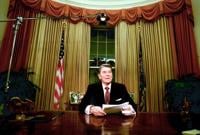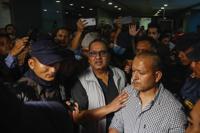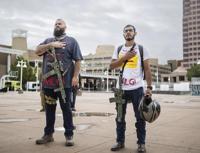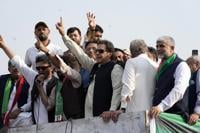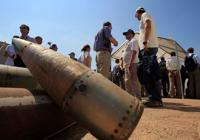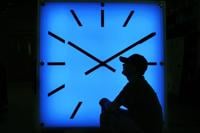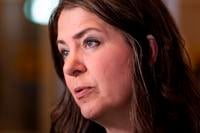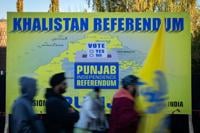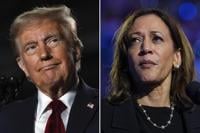The age question for presidential candidates is more than four decades old. President Ronald Reagan answered it with a pledge to resign if he became impaired, and later with a clever joke that reset his campaign from a stumbling debate performance to a 49-state landslide and a second term.
"I will not make age an issue of this campaign," Reagan said to the question he knew was coming in perhaps the most famous mic-drop moment in campaign history. "I am not going to exploit for political purposes my opponent's youth and inexperience."
The audience roared, even Democratic Vice President Walter Mondale laughed — and Reagan's reelection was back on track.
Today, Democratic President Joe Biden, 81, is struggling for such a redemptive moment after a disastrous debate performance against Republican former president Donald Trump, 78. Those 90 minutes last week set off alarms among Democrats hoping Biden would keep Trump from returning to the White House — and heightened concern among of how either elderly man would govern a complex nation of more than 330 million people for four more years.
described him as often sharp and focused. But he also has moments, particularly later in the evening, when his thoughts seem jumbled and he trails off mid-sentence or seems confused, they said. Sometimes he doesn’t grasp the finer points of policy details. He occasionally forgets people’s names, stares blankly and moves slowly around the room, they said.
"I am running … no one’s pushing me out,” Biden said on a call Wednesday with staffers from his reelection campaign. “I’m not leaving. I’m in this race to the end and we’re going to win.”
But the question facing him is far more intimate, according to one expert who covered Reagan's health during his presidency.
“The most important debate of the campaign is the one taking place right now in Joe Biden’s head between the part of mind telling him he’s the chosen one, and the more self-aware part,” said Rich Jaroslavsky of the University of California Berkeley, formerly of the Wall Street Journal.
A nation ever more accustomed to dealing with aging
At its heart, the question — how old is too old to be president? — is about competence. And Americans have never had wider personal experience with the effects of aging than they do today.
A surge of retiring means that millions more Americans know when they see someone declining. For many, this widespread experience made Biden’s halting performance during a familiar reality check.
Trump seemed more vigorous, even though . When he challenged Biden to a cognitive test, who had administered his.
“Is this an episode, or is this a condition?” Rep. Nancy Pelosi, D-Calif., 84, wondered on MSNBC, reflecting the question dominating Democratic circles this week. "It’s legitimate — of both candidates.”
Reagan faced the same questions even before he was elected as the oldest president to that point. In 1980, at 69, he pledged to resign if he sensed serious cognitive decline while in office.
“If I were president and had any feeling at all that my capabilities had been reduced before a second term came, I would walk away,” he told the New York Times on June 10, 1980. "By the same token, I would step down also.”
That didn't happen. Reagan served two full terms, leaving office in 1989. He announced in 1994 that he had been diagnosed with disease. He died in 2004.
Neither Trump nor Biden has made a similar pledge, and their campaigns did not respond to requests for comment Wednesday.
For Reagan, the age issue faded in his first term as any health questions focused on his recovery from a nearly fatal assassination attempt in 1981. He seemed headed for an easy reelection. And debates seemed natural settings for the smooth-talking former Hollywood actor. But his performance in the first showdown with Mondale in the 1984 campaign brought the age issue roaring back.
The president, then 73, rambled and hesitated. He seemed to lose his train of thought at one point, and appeared tired at others. No one had seen him perform publicly in such a way, recalled Jaroslovsky, who co-authored a story headlined: “New Question in Race: Is Oldest U.S. President Now Showing His Age?”
Important differences between 1984 and 2024
Reagan's age — really, his fitness for a second term — was now indelibly part of the 1984 race, a striking parallel to what is happening in 2024 in the aftermath of Biden's shaky debate performance. But there are key differences.
Reagan was leading going into the first debate, while Biden and Trump were virtually tied. Onstage, "Biden was terrible out of the gate,” said Jaroslovsky, the founder of the Online News Association.
Then, as now, Jaroslovsky said, the embattled president's supporters provided vigorous spin.
Reagan's operation said he had been tired. There was sniping about the staff overpreparing him, Jaroslovsky said. Biden's team cited fatigue from two overseas trips that had exhausted even younger staffers. It was a bad night, they said. Blame flew at the president's aides. that Biden's performance had damaged their chances at the polls. that reporters had failed to hold the president and his staff to account.
By Tuesday, to withdraw from the race and open a to nominate someone else. The crisis just over six weeks before its convention in Chicago. It's not clear that Biden and Trump will debate a second time.
Reagan's moment in 1984 came during the second debate at the 33 minute-mark, when The (Baltimore) Sun's Henry Trewhitt said: “You already are the oldest president in history, and some of your staff say you were tired after your most recent encounter with Mr. Mondale." Here, Reagan squared his feet and suppressed a smile. He was ready.
Trewhitt noted that President John F. Kennedy (the youngest American elected president) got hardly any sleep during the Cuban Missile Crisis: “Is there any doubt in your mind that you would be able to function in such circumstances?”
“Not at all, Mr. Trewhitt," Reagan said. Later, he declared, “I am in charge.”
___
This story corrects Trump’s age to 78 throughout.


